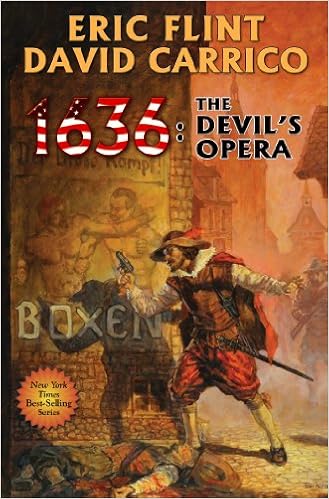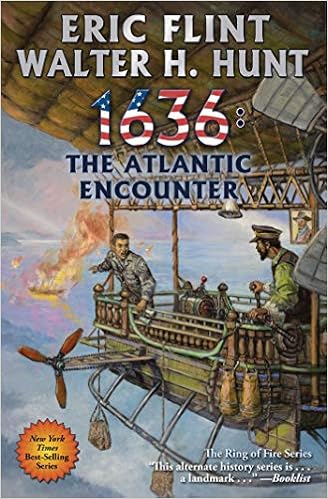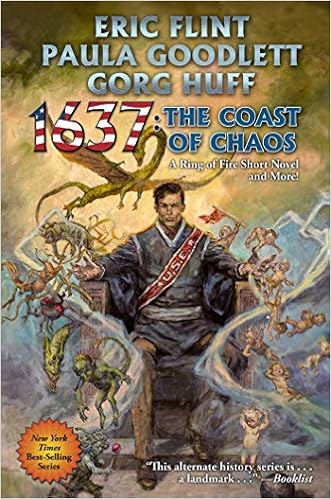
Description
Review Advance praise for The Rivers of War“Eric Flint [drops] his readers into another time and place, where cultures collide, the action is hot and heavy, and we get to experience the best of the human spirit.”–DAVID WEBER, New York Times bestselling author of the Honor Harrington adventures“Eric Flint has a genius for taking his passion for history and turning it into powerful, action-packed stories that instantly grab the readers and plunge them into a time and place that might have been.”–DAVID DRAKE, author of The Far Side of the Stars and Redliners About the Author Eric Flint graduated summa cum laude and Phi Beta Kappa from UCLA with a degree in African history. His first novel, Mother of Demons, was picked by Science Fiction Chronicle as a best novel of the year. His alternate history novels, 1634: The Galileo Affair, and 1632, received lavish critical praise. He has collaborated with David Drake on five novels in the acclaimed Belisarius series, the next of which will be The Dance of Time. A longtime labor union activist, he currently resides in northwest Indiana with his wife, Lucille. Excerpt. © Reprinted by permission. All rights reserved. CHAPTER 1 February 6, 1814Fort Strother, Mississippi TerritoryThe first time Sam Houston set eyes on Andrew Jackson, the general’s left arm was in a sling, and he was losing his temper.“Do I make myself clear, sir?”Jackson’s eyes were like small blue volcanoes erupting under bushy blond eyebrows and an even bushier head of sandy-gray hair. The scar on his forehead actually seemed to be throbbing.Sam had heard tales about that scar. Supposedly, it had been put there decades ago, during the Revolution, by a British officer. After seizing the home occupied by Jackson and his family in the Carolinas, the Redcoat had ordered a thirteen-year-old Jackson to shine his boots. Jackson had flat refused, and hadn’t changed his mind even after the officer slashed him with a saber.When he’d first heard the story, Sam had been skeptical. Now, watching Jackson with his own two eyes, he didn’t doubt it any longer. The general’s jaws were clenched, his bony fists were clenched, his whipcord body was clenched. He seemed ready to jump right out of his uniform and start pummeling the officer who was facing him.“Answer me, blast you!” Jackson bellowed. Shrieked, rather, since he had a high-pitched voice. The general thrust his head forward so aggressively, his chin leading the way like the ram on an ancient war galley, that his fancy hat fell right off his head. The two-cornered general’s hat landed on its side, like a shipwreck on a reef. Jackson paid no attention to the mishap.The officer who was facing him—somebody in the Tennessee militia, judging from the uniform—was doing his level best not to wilt under Jackson’s fury. But his level best . . .Wasn’t good enough. Not even close.The man sidled backward a step, his eyes avoiding Jackson’s accusing gaze. “Tarnation, General,” he muttered, “you can’t just—”“Yes, sir, I can! And, yes, sir—I most certainly will! I’ve done it before, and I’ll do it again!”For the first time, Jackson seemed to catch sight of the two officers who had entered his command tent. He glared at General John Coffee first. But the glare was fleeting, nothing more than a split second’s reflex.“Coffee,” he stated tersely. The greeting had an approving air to it, from what Sam could tell.But then the glare turned on Sam himself, so he didn’t have any time to ponder the matter.It was quite a glare, too. Easily worthy of one of the heroes in Sam’s treasured Iliad. Maybe not quite up to the standards of Achilles, but certainly the equal of anything Agamemnon or Menelaus could have managed.“And you, sir!” the general barked. “You’re wearing the uniform of a regular soldier in the army of the United States of America. Can I assume that you will follow orders?”The general’s eyes flicked to the militia officer. Jackson said nothing, but the glance alone was enough to make clear what he thought of the fellow.Sam might have been amused, except he was starting to become angry himself. He didn’t like bullies, never had, and the general looked to be about as bad a bully as he’d ever encountered.“Yes, sir,” he said stiffly, straightening up to his full height of six feet two inches. “I took the oath and I’ll obey orders. Presuming the orders are lawful, that is.”With that, he fell silent. For a moment, it looked to Sam as if the general would literally explode. His pale face seemed so suffused with blood and fury that his temples threatened to burst. Both of them were throbbing now.Then, to Sam’s surprise, the general grunted a little laugh. “Ha! Got some backbone, do you? Good.”Jackson pointed a stiff finger at the target of his rage. “The issue in question here, young ensign, is whether or not these miserable militiamen will be allowed to desert their country in its time of need. I have informed this—this—this—individual that I will have shot any militiaman who attempts to desert.”The fact that the general’s left arm was in a sling only added emphasis to the rigid, accusing finger of the other hand. For two reasons. First, because Jackson seemed to have an uncanny knack for striking dramatic poses. The lion, wounded, yet still able to challenge the hyena. Second, because the militia officer knew—so did everyone, including Sam himself—that the wound in question was the result of a recent shootout at a hotel in Nashville between Jackson and his friend Coffee and the Benton brothers. The pose might be histrionic, but Jackson’s capacity for violence was by now a legend on the frontier.Again, that jaw thrusting forth. “Damn me if I won’t, sir!” he roared. “I’ll shoot them myself, if I have to!”The jaw receded, leaving the man a sinking wreck. Jackson’s eyes turned back to Sam. “I will trust you to carry out the order, young ensign. If you’ve got spine enough to stand up to me, you ought to have spine enough to shoot a worthless deserter.”The officer, though sinking, hadn’t quite dropped out of sight yet.“General,” he pleaded, “the terms under which the men enlisted—”“Blast your terms, sir! Blast them, I say!”This time, Jackson’s finger pointed out of the tent. “Do the Red Sticks care about your ‘terms’? I’ll crush those savages, so help me I will—and you’ll be there to help me do it. You will, sir! Don’t doubt it! Or I’ll crush you first!“Now get out of my sight. Your protest has been heard, adjudged wanting in all right or reason, and summarily dismissed.”With that, the general took a half step back himself, as if he’d encountered a bad smell. The officer took advantage of the momentary space and scuttled out of the tent.After he was gone, Jackson shook his head. “God save us from militiamen,” he growled. “Lawyers, every one of them. And shysters at that.”His eyes came back to Sam, ranging, for a moment, up and down the uniform that identified him as a regular in the Thirty-ninth Infantry, U.S. Army. While European armies had adopted close-bodied coats or jackets in the course of the Napoleonic wars, American uniforms remained the traditional cutaway style, with elaborate lapels, facings, and turnbacks. Coats were still closed with hooks and eyes rather than buttons.Sam’s uniform was typical. The coat was blue and long-skirted, with scarlet cuffs and a standing collar. The woolen trousers were white, plain, and tucked into his boots. He had his tall leather infantry cap—often called a “tombstone shako”—tucked neatly into the crook of his arm.After an inspection that lasted for several seconds, Jackson seemed satisfied. “Fortunately,” he continued, “I now have real soldiers on the spot. What’s your name, Ensign? And how long have you been serving the colors?”“Sam Houston, sir. I enlisted in March of last year.”Jackson eyebrows lowered slightly. “Houston. I believe I’ve heard about you. Aren’t you the one who was adopted by the Cherokee?”The sentence seemed almost like an accusation, but . . . not exactly. Sam couldn’t really tell what lay beneath it.“Yes, sir,” he replied. “When I was sixteen, after I ran away from home. I lived for three years with John Jolly and his people. He’s the one adopted me, and gave me my Cherokee name.”“And that is?”“Colonneh, sir. It means ‘The Raven.’ ”Jackson sniffed. “Nasty birds, ravens. On the other hand, they’re also tough, and smart. Let’s hope they picked the right name. Do you speak the language?”“Yes, sir.”“Fluently?”“Yes, sir.”“Do you get along with the savages?”“Very well, sir.” Sam’s big shoulders shifted. “And I don’t take kindly to people insulting my family.”Jackson surprised him again. The general grinned—rather cheerfully, it seemed. “It’s against the law to challenge a superior officer, youngster, so you’d best leave the rest of that thought unspoken. I’d have to shoot you dead, and I’d prefer not to do that. Still and all, I’ll refrain from using the term. In your presence, at least.” There was a hint of sarcasm in his voice.The general rubbed his long chin. “I can use you for liaison then, if Coffee needs it. We’ve got five hundred Cherokees allied with us in this campaign, and about a hundred friendly Creeks. Do you speak their language, too?”Sam hesitated. That was a hard question to answer. The Creek Confederacy was an amalgam of a number of tribes of different origins, further divided between the so-called Upper and Lower Towns. The term “Creek” itself was a white man’s word. Creeks were more likely to think of themselves as Coweta or Alabama or Tuskegee.“Well . . .” he began.But apparently Jackson understood the reality of the situation. “Any of the dialects?”“I can get along, sir, with some of them. I speak a little Choctaw, also.”“No Choctaws with us on this campaign, so that doesn’t matter. It might later, though. Once we’re done with the Red Sticks, we’ll be facing the British, you can be sure of it. Maybe the Spanish, as well. John? Do you want him? If you do, I’ll have Colonel Williams detach him from duty with his regiment.”The officer who had accompanied Houston shrugged his shoulders. “I could certainly use Ensign Houston, General, but I don’t really need him. At least a third of the Cherokees speak English. The Ridge doesn’t, true enough, but he’s got that young John Ross fellow to translate for him.” Major Coffee chuckled. “Of course, I don’t think Ross really speaks Cherokee all that well. But we’ll get along, true enough.”Jackson nodded. “All right, then. To tell you the truth, John, it’d probably be better to keep the ensign with his unit. I’ll be counting on the Thirty-ninth to keep the ragtag-and-bobtail in line.” He glanced at the flap of the tent through which the militia officer had beat a hasty retreat. “I think I did a pretty good job of bullying the little piglet. But you know as well as I do that they need bullying on a regular basis. How was my tantrum, by the way?”Coffee smiled. “Pretty good. Not your very best, though.” The major looked down at Jackson’s hat, which was still lying on the floor. “For a really top performance, you should have stomped on the hat.”The general stared down at the object in question. “Tarnation. I didn’t think of that.” He seemed genuinely aggrieved.Jackson stooped over and picked up the hat, brushed it off, then jammed it back onto his head. By the time he was finished, Sam was thoroughly amazed at the transformation in the man. The general who now stood before him, smiling and relaxed, seemed like a completely different person.Jackson gave him a cool, thin smile. “A lesson here, Ensign Houston, which will stand you in good stead. A reputation, once developed, is as valuable as a fine sword.”Then the smile became very thin. “But don’t forget that it has to be a valid reputation. Or the sword’s got no edge. I will shoot the bastards, if I have to.”There didn’t seem to be much to say to that, so Sam kept his mouth shut. After a moment, the general turned away and motioned for them to follow him to a table that stood in the corner of the tent. “And now, John, let’s discuss the campaign.”There was a large map spread across the table. “The Georgians are worthless, as usual,” Jackson growled. “There’s nobody quicker to steal land fromIndians, but whenever it comes to having to actually fight the savages—”He broke off, tossing Sam a sly glance. “Excuse me, Ensign. I should have said ‘the gentlemen of the red-skinned race.’ But whatever you call them, the Georgians run for cover every blasted time they appear. I just got word that General Floyd has retreated—again—and relinquished command to Colonel Milton at Fort Hull. Who’ll probably be just as useless as every Georgian seems to be. So it’ll be up to us Tennesseans to put an end to the Red Sticks.”Coffee studied the map intently, as did Sam. It was hand-drawn, and showed the terrain of the Territory of Mississippi, where the Red Sticks were concentrated. The Red Stick faction of the Creeks, the southern allies of Tecumseh, came mainly from the Confederacy’s Upper Towns. By and large, the Lower Town Creeks had either remained neutral or were allied with the United States.American newspapers tended to portray the Red Stick war as an attack on white settlers. It was that, certainly, but it was more in the way of a civil war among the Creeks themselves. The people massacred at Fort Mims by the Red Sticks a few months earlier, on August 30, had mainly been Creeks, not whites. Mixed-bloods, true, most of them—but the same could be said of the Red Sticks, especially their leaders. Tecumseh and his brother The Prophet had sought to unite all Indians against the whites. But, like most Indians, they viewed the distinction between “red men” and “white men” more along cultural lines than strictly racial ones. Many of Tecumseh’s followers, especially the Creek warriors of the Red Stick faction, had some white ancestors themselves.Tecumseh himself was dead now, killed in Canada in October, when U.S. forces under the command of General William Henry Harrison had defeated the British and their Indian allies at the battle of the Thames. It was reported that Colonel Richard Johnson, who’d led the final cavalry charge and had been badly wounded in the affray, had shot Tecumseh personally. But the fires Tecumseh and his brother The Prophet had lit among the many Indian tribes were still burning in the southern territories of the United States.Coffee rubbed his chin. “Are you sure you don’t want to wait for the Georgians to regroup, General?” His finger traced the lines of the Coosa and Tallapoosa rivers. “We’re not going to move easily through this terrain. It’s pretty much pure wilderness, by all accounts I’ve received.”Jackson shook his head impatiently. “We haven’t time for a slow campaign, John. The real enemy is the British, don’t ever forget it. We’ve got to crush this uprising as soon as possible or we’ll still be tied up when the British arrive.”“You may be jumping to conclusions, General. Napoleon might beat them, you know, even after his defeat at Leipzig. If he does, the British won’t be in any position to send more troops all the way across the Atlantic.”Sam was a little surprised that Coffee didn’t hesitate to argue the matter. After witnessing the Homeric temper tantrum Jackson had just thrown, Sam himself would have been a little hesitant to disagree with him under any circumstances. Read more
Features & Highlights
- Eric Flint’s acclaimed 1634: The Galileo Affair was a national bestseller from one of the most talked-about voices in his field. Now, in this extraordinary new alternate history, Flint begins a dramatic saga of the North American continent at a dire turning point, forging its identity and its future in the face of revolt from within, and attack from without. In the War of 1812, U.S. troops are battling the British on the Canadian border, even as a fierce fight is being waged against the Creek followers of the Indian leader Tecumseh and his brother, known as The Prophet. In Europe, Napoleon Bonaparte’s war has become a losing proposition, and the British are only months away from unleashing a frightening assault on Washington itself. Fateful choices are being made in the corridors of power and on the American frontier. As Andrew Jackson, backed by Cherokee warriors, leads a fierce attack on the Creek tribes, his young republic will soon need every citizen soldier it can find.What if–at this critical moment–bonds were forged between men of different races and tribes? What if the Cherokee clans were able to muster an integrated front, and the U.S. government faced a united Indian nation bolstered by escaping slaves, freed men of color, and even influential white allies? Through the remarkable adventures of men who were really there–men of mixed race, mixed emotions, and a singular purpose–The Rivers of War carries us in this new direction, brilliantly transforming an extraordinary chapter of American history.With a cast of unforgettable characters–from James Monroe and James Madison to Sam Houston, Francis Scott Key, and Cherokee chiefs John Ross and Major Ridge–The Rivers of War travels from the battle of Horseshoe Bend to the battle of New Orleans, and brings every explosive moment to life. With exquisite attention to detail, an extraordinary grasp of history, and a storyteller’s gift for the dramatic, Flint delivers a bold, thought-provoking epic of enemies and allies, traitors and revolutionaries, and illuminates who we are as a nation, how we got here, and how history itself is made–and remade.





